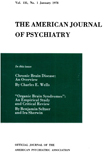THE MEDICAL VIEW OF THE MENOPAUSE
Abstract
This then is the medical view of the menopausal epoch which transforms the physical and psychic personality of an individual. It is a series of regressions in those functions of growth and maturation which appeared at puberty and are now in a certain way reversing themselves. When problems do arise it is because the new changes are not moulding themselves harmoniously and evenly. The normal menopause like normal puberty is evolutionary, but the abnormal has become revolutionary, until the many facets of the new biochemistry settle into that new compromise governmental arrangement which is the altered person. We need to know and to be able to measure and record simultaneously all the various stimuli and hormones coming from and going to the hypothalamic region. Until we can do this and have potent substances to use, we cannot expect to make good the deficiencies or to suppress or counterbalance the excesses of deteriorating irritable tissues in order to relieve the discomforts which go with them. We can do these things in diabetes, because we have insulin; in myxædema and in toxic adenoma, because we have a potent substance in desiccated thyreoid, and we can remove a toxic adenoma. Of course, these are early days of endocrine chemistry. In the menopause, at this date, we have to leave the patient's chemical processes largely to their own devices. And so the most important treatment to follow, as in many other uncomfortable episodes of living, is psychotherapy. This is really explanation plus discipline. As ever, the way to do this successfully is to have a knowledge of your subject which entitles you to speak with conviction, to be sincerely sympathetic and to talk in common-sense terms about the present and the future—not the past. One must take time to do it; for an hour spent on positive and purposeful psychotherapy will save a great many hours later on—perhaps by someone else. It is helpful to give a small dose of phenobarbital three times a day; bromides are not as good.
Access content
To read the fulltext, please use one of the options below to sign in or purchase access.- Personal login
- Institutional Login
- Sign in via OpenAthens
- Register for access
-
Please login/register if you wish to pair your device and check access availability.
Not a subscriber?
PsychiatryOnline subscription options offer access to the DSM-5 library, books, journals, CME, and patient resources. This all-in-one virtual library provides psychiatrists and mental health professionals with key resources for diagnosis, treatment, research, and professional development.
Need more help? PsychiatryOnline Customer Service may be reached by emailing [email protected] or by calling 800-368-5777 (in the U.S.) or 703-907-7322 (outside the U.S.).



